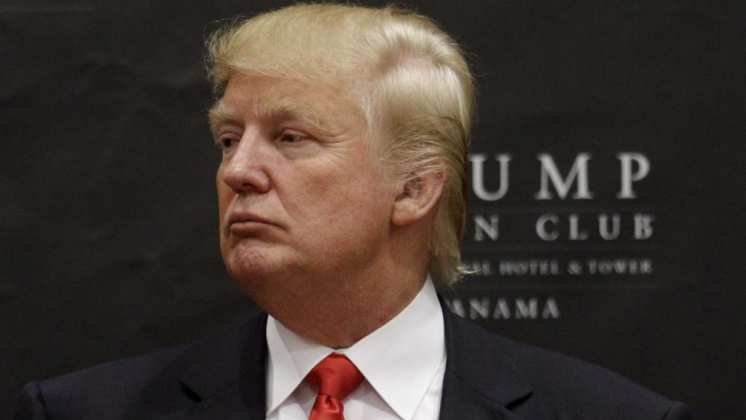Top 10 foreign policy haters of Donald Trump
A man is judged by the company he keeps. The opposite is also true: we can judge a man by the company who hates him. Here we gathered the important foreign policy experts who hate Trump or are severe critics of the hopeful GOP nominee for different reasons. Let's see who hates Donald Trump and why. Maybe it can help you to understand Trump’s approach to foreign policy better.
1. Bill Kristol, editor of the neoconservative Weekly Standard
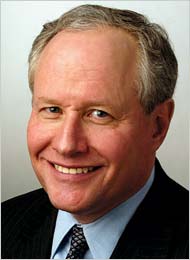
The Weekly Standard Editor Bill Kristol said that he would rather have Hillary Clinton in the White House than the Republican front-runner. He believes that the best way to stop Trump is through a brokered Republican Party convention in Cleveland in July.
Donald Trump would make "a terrible nominee and a terrible president" - declared Kristol
The neoconservative hawk is dissatisfied with Trump's realist foreign policy vision and his independence from the influential Israeli lobby. Well, Trump is not an anti-Semite, and he even has Jewish relatives, but he has declared in the past that he will not support the Zionist state at any cost. He also wants to review the role of NATO and American involvement in common NATO structures to diminish the financial burden on America. This means that he wants to abandon the hawkish project of American world hegemony (which in fact turned out to be the hegemony of world tiny elite) and replace it with a model where America remains a great power, but concentrates more on its own problems.
2. The main specialist who criticized Trump in the camp of neocons is Max Boot, a Russian Jew émigré from Moscow and foreign policy adviser for Marco Rubio.

He has written dozens of anti-Trump articles, where he argues that his independent politics will bring disaster to the US. For him, Trump is representative of the old American populist isolationist tendency, which once died, but today has been resurrected:
«When Ted Cruz used the same description, one could imagine it was a dog whistle because this Princeton and Harvard Law graduate presumably knows that "America First" was the isolationist, Nazi-sympathizing movement led by Charles Lindbergh before World War II. In Trump's case, it's no doubt an accurate reflection of his quasi-isolationist philosophy and also of his almost limitless ignorance. He probably has not heard of the original "America First," and now seems eager to repeat all of its errors. For example, he called NATO - the most successful alliance in history and one that is still vital to America's defense - "obsolete." Spoken like a true, if unconscious, disciple of Lindbergh».
Max Boot told The New York Times "I would sooner vote for Josef Stalin than Donald Trump". "There is no way in hell I would vote for him. I would far more readily support Hillary Clinton," Boot added.
3. Another prominent neoconservative Trump-hater is Robert Kagan.
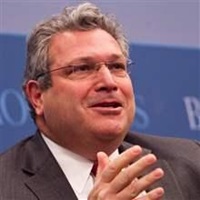
The husband of infamous Victoria Nuland declared that he intends to back Hillary Clinton if Donald Trump receives the GOP nomination. He is calling Trump the Republican “Frankenstein”
4. Collin Powel, former Secretary of State under George Bush Junior, is also one of main critics of Donald Trump.
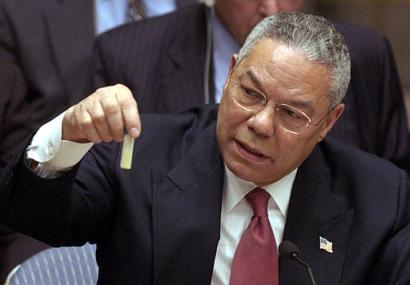
He criticized his stance on immigration and blamed him for using the labor force of immigrants. According to Powell, the US should not stop immigration flows from Latin America:
"I think the American people have to understand we're an immigrant nation," he said, adding, "it is our history, it is our tradition ... we have been built on the backs of immigrants."
Powell was one of the main supporters of the American invasion in Iraq, which was lately criticized by Trump. Despite Trump’s words, Powell never mentioned that his stance on Iraq was a mistake.
5. Ralph Peters, colonel of the US army, Fox news expert, author of the concept of Constant Conflict, post-modern theory of war, and proponent of the Great Middle East Plan (bloody partition of the region) is another prominent Trump-hater.
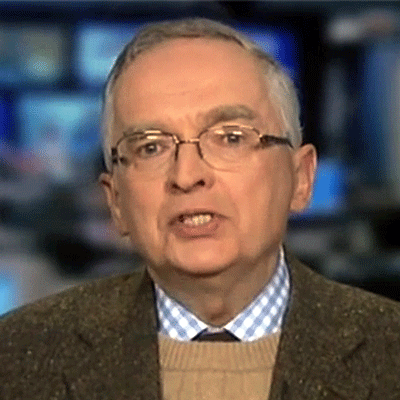
He believes, that the US must realize the policy of creating constant chaos in the world by rejecting any responsibility for the destroyed regions of the country. Also, he pledges American informational dominance through the most primitive and dumb forms of mass-culture. Peters is a supporter of the aggressive US policy towards Russia and any other powers that could challenge American hegemony. He is a postmodernist hawk who opposes the very concept of sovereignty, which he considers to be outdated.
Realist Trump adheres to a directly opposite position. For him, the chaos is not a source of opportunity, but a source of threats. Creating controlled chaos in the Middle East and the Arab Spring were the result of the realization in practice of what Peters described. That is what has caused a new wave of Islamic terrorism that only Trump considers to be a threat to the country, and Peters probably does not.
6. Wesley Clark is a retired General of the United States Army. He commanded Operation Allied Force in the Kosovo War during his term as the Supreme Allied Commander Europe of NATO from 1997 to 2000.
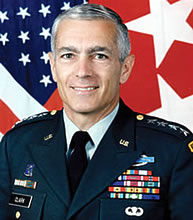
Due to this military campaign, he received the nickname “butcher of Serbia” in Europe and Russia. Clark always supported the Democratic interventionist policy. He criticized Donald Trump for his comments about the obsolete role of NATO:
"I think it represents a fundamental misunderstanding of how foreign policy works and what keeps the United States safe in the world. NATO's absolutely vital to the United States, it's not obsolete. It is the foundation for U.S. foreign policy. It ties the United States to Europe and that's a group of 500 million people, those who most closely share our values in the whole world.”
7. Joseph Nye Jr., a prominent neoliberal scholar and adviser to Hillary Clinton, is also one of most famous anti-Trumpists in the sphere of international relations.
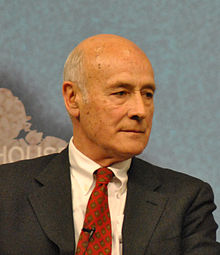
According to him Trump's populist stance represents a lack of understanding towards globalized society not only by Trump, but also by the major part of American society. He believes that an example of a good leader today is German Chancellor Angela Merkel, who opened the doors for migrants to change the cultural landscape of the country:
«Good leaders today are often caught between their cosmopolitan inclinations and their more traditional obligations to the people who elect them - as German Chancellor Angela Merkel has discovered in the wake of her brave leadership on the refugee crisis last summer»
8. Michael Chertoff is the former Secretary of Homeland Security under President George W. Bush.
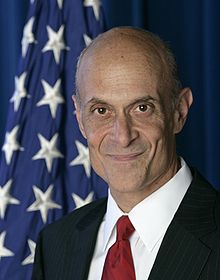
His family name is translated from Russian as "Son of Devil", but in fact his father was Rabbi Gershon Baruch Chertoff (1915-96), a Talmud scholar and the former leader of the Congregation B'nai Israel Elizabeth in Millburn. His mother is Livia Chertoff (née Eisen), an Israeli citizen.
Chertoff was one of top GOP security experts who signed the joint anti-Trump declaration condemning the real estate mogul as unfit for office. Among their pretensions to Trump, a significant one was:
“His admiration for foreign dictators such as Vladimir Putin is unacceptable for the leader of the world's greatest democracy.”
9. Stephen Krasner is another person who signed this letter.
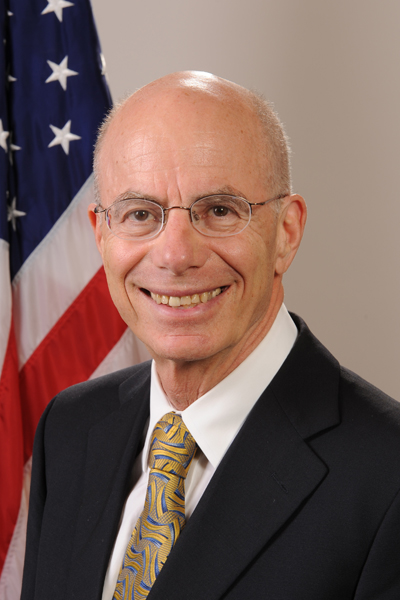
He is a prominent American scholar, an international relations professor at Stanford University, and a former Director of Policy Planning at the United States Department of State, a position he held from 2005 until April 2007 while on leave from Stanford. He is a senior fellow at Stanford's Hoover Institution. He is known as neorealist thinker who opposes the Westphalian conception of sovereignty.
Krasner, in his theories, distinguishes concepts such as a "weak state", which, in his view, is a factor of instability and a threat to the "powerful states". The "weak state" is unable to provide the application of laws on its territory, and creates favorable conditions for the centers of international terrorism to appear. Krasner supposes that to prevent this, the "weak states" should be under the control of "strong states”, which have global and regional hegemony. The fact that the state is weak is enough reason to interfere into its domestic affairs. This idea is developed in his theory of "graduated sovereignty", believing that not all the nominally sovereign states should be regarded as fully sovereign. True sovereignty only exists in the developed democratic Western states. Thus, Krasner theoretically justifies the American interventionist policy.
He is a clear example of the rejection of Trump's classical realism by neorealists.
10. Another representative of the neorealist camp who is suspicious of Trump is Stephen Martin Walt.
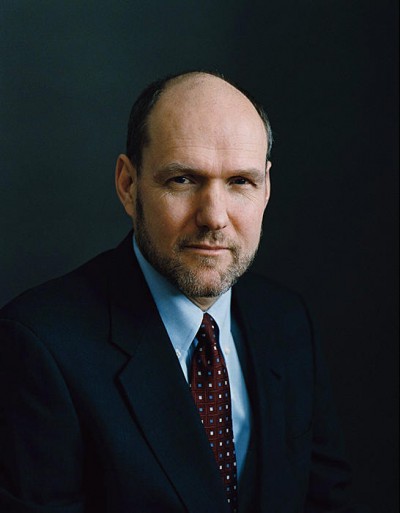
He is an American professor of international affairs at Harvard University's John F. Kennedy School of Government, and is one of world most famous neorealists. He is known as a representative of the defensive realist approach; he attacks Trump from the other side. In his article “Trump's Rear-View Politics”, Stephen M. Walt criticizes Trump's nostalgia for America's greatness, saying that this era of American dominance has gone. He said:
“The foreign policy the United States followed during the early years of the Cold War might have been the right one when Europe was still rebuilding, the US had upward of 40 percent of gross world product, and the Soviet bloc posed a looming if uncertain threat, but that same policy may be unnecessary or counterproductive in a globalized world of nearly 200 states, many of them fiercely opposed to foreign interference, the absence of a similar geopolitical rival, and a host of other challenges unimaginable in 1947.”
Walt opposes the muscular, militaristic part of Trump's rhetoric, not the isolationist one. He is an exception in a line of interventionist and globalist anti-Trumpists, but the presence of only one exception confirms the rule

